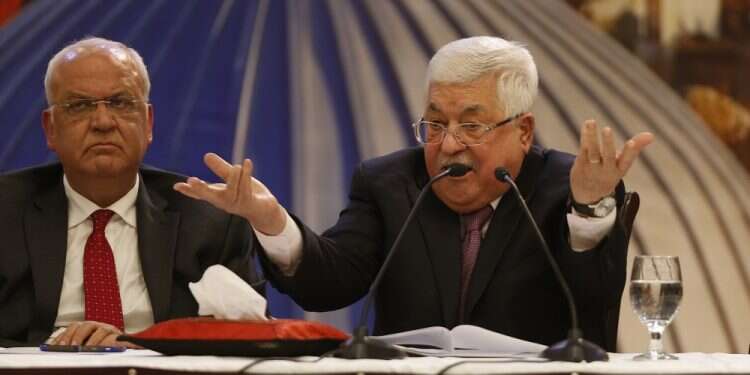The Palestinians were quick to disparage Trump's "deal of the century" terming it "the Insult of the Century", but are deep in denial about their part in its creation. Their grand expectations, built up over the decades, that there would be an international plan that would force upon Israel a sovereign Palestinian state on all of the West Bank with a mass return of refugees that would shatter the foundations of the Zionist state, all evaporated instantly, usurped instead by another plan that they see as the worst possible outcome.
One must acknowledge that the Palestinians' stubborn adherence over the years to their demands and their refusal to compromise over the "minimum conditions" were probably based on two solid pillars: The support of the international community, in particular, the pro-Arab camp in the United Nations, and the strong backing they received from the Arab states. This week they realized, to their utmost despair, that these pillars had collapsed, or at the very least had developed deep cracks.
Follow Israel Hayom on Facebook and Twitter
How on earth had the European Union gone from being viewed by the Palestinians as a "balancing factor" in the face of a "pro-Israeli American government," to suddenly welcoming Trump's plan and not rising up against it? And why on earth are European leaders not rushing to stand as one and back declarations by the international community which had become the Palestinians' main refuge?
And what has prompted the dramatic shift in the Arab bloc's position, just 73 years after they had sent their militaries to block the implementation of the "partition plan" for two states, a plan that was terrible and dangerous for Israel? Instead, this week, they sent three of their ambassadors to the White House for the unveiling of a partition plan that is wonderful for Israel, and seemingly terrible for the Palestinians.
Were they not so beholden to their false outlook, the Palestinians would realize that the shift in the Arab position is not so dramatic or sudden, but rather the result of a gradual change.
In Khartoum, Sudan, in 1967, it was decided that there would never be Arab recognition of Israel, no peace, and no negotiations. But in Beirut in 2002, it was decided that an Israeli withdrawal from the West Bank and a solution for the refugee problem would bring about the end to the conflict with the Arab world, leading to peace and full normalization of ties. And in recent years, even before the formulation of the deal of the century, some Arab states from the Sunni bloc began to normalize their relationship with Israel "under the table".
The Europeans had had enough, but they were not alone. The Israeli-Palestinian conflict is a thorn in the side of most Arab states, which are dealing with extremely difficult issues of their own. Even though only three Arab ambassadors were present at the White House ceremony, many of the leaders of the Sunni bloc believe that now that Israel has accepted the principle of two states – even if those conditions are less advantageous for the Palestinians – President Mahmoud Abbas must end his boycott and immediately reenter into discussions with the Americans.
This weekend, the Arab foreign ministers will meet for an emergency meeting at the behest of Abbas. The public speeches may still voice support for the Palestinian position. But behind the scenes, he will be advised to move towards a solution and away from the idea of an armed conflict that Hamas will advocate in its meetings with the delegation Abbas decided to dispatch to Gaza "for the sake of unity" at this time of great emergency for the Palestinian people.
Reading between the lines, it seems as though the United States put considerable effort into preparing the ground with the moderate Arab states ahead of the release of the plan. The fact that the Saudi Crown Prince tried to convince Abbas that it "would not be a disaster" if the Palestinian capital is in Abu Dis (as we reported here exclusively for the first time) shows that he was in on at least some of the details of the deal.
Nonetheless, despite the attempts by some Arab leaders to convince them otherwise, it seems unlikely that there will be a Palestinian partner for implementing the Trump peace plan any time soon. Israel would do well to call on the Palestinians to enter into negotiations on the plan, despite Abbas' resolute opposition, and in addition, take steps to placate the Jordanian king who supports the idea of Israeli sovereignty over the Jordan Valley in his heart, but it deeply perturbed by the possible implications of such a move on the stability of his kingdom.




